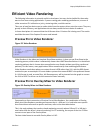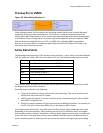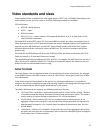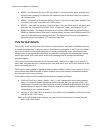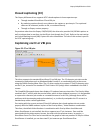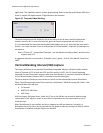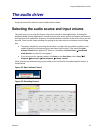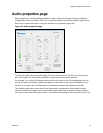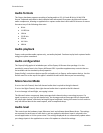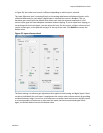AVStream Driver Reference Information
70 ViewCast
The driver has three built-in user-accessible controls that affect Closed Captioning.
On the RefSize property page, in the control group shown below, 480-line video must be
selected and the radio button to start video at either Lines 23/286 or Lines 22/285 must be
selected.
On the Captions property page, most of the controls relate to the driver’s internal direct
rendering on video. The following control selects field 1 or field 2 as the field to be streamed
through the CC pin. This control is per-filter; both available pins on the filter are set the
same way. For SimulStream users, the pins on different filters can have different settings.
On the Device -> Extras… property page, you have the choice to set with Normal or AVI-
Compatible timestamping of Closed Caption samples.
This control is a workaround to an apparent problem in DirectShow – if you attempt to capture a CC
character pair stream to an AVI file with Normal timestamping, the file becomes extremely large and
the capture will fail within a few seconds. The AVI-Compatible mode allows capture of CC to AVI.
Unfortunately, the problem with timestamping means that time synchronization between the video
and CC streams depend on their physical interleaving in the file, so that time synchronization is
poor. If the AVI file is set up to be non-interleaved, synchronization is not good. If the AVI file is set
up to be interleaved, synchronization is poor.
For all applications other than capture to AVI, this control should be set to Normal. WME9 among
others requires the Normal setting if CC is used.
Windows Media Player does not play back an AVI file with an embedded CC stream. The following
GraphEdit filtergraph plays back an AVI file containing a video stream plus a CC stream, with the CC
rendered on the video:
Direct CC rendering on video
The driver can render closed captions directly onto capture or preview video. The captioned video
can be encoded, written to file, or rendered directly to the screen.




